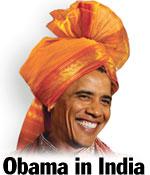 | « Back to article | Print this article |
'Obama should back India's UNSC bid during visit'
United States Barack President Obama during his visit to India -- and preferably during his address to India's Parliament -- should do something big, like declaring 'forthrightly' Washington's support for India's bid for a permanent seat on the United Nations Security Council, another report by the Carnegie Endowment for International Peace has said.

The report, an advance copy of which was made available to rediff.com, authored by Ashley J Tellis, a former Bush administration official, who was intimately involved in the negotiations of the US-India nuclear deal, recalled that "the US government toyed with this idea during the preparations for Bush's visit to India in 2006, but the imperatives of completing the civil nuclear agreement ultimately took priority."
"Since then, senior officials in the Bush and now the Obama administration have tantalizingly insinuated that India would be a suitable candidate for UNSC membership, but never categorically declared Washington's support for New Delhi," the report noted.
Tellis, a senior associate at CEIP, exhorted that Obama "should now take the decisive step for several reasons," and argued that "first, if UNSC reform occurs, it is simply inconceivable that the reconfigured body would not include an India that is on track to become the world's third- or fourth-largest economy, possesses major military capabilities, remains a pluralist liberal democracy, and is a nuclear weapons state."
"Second," he pointed out, "three of the five permanent members of the UNSC -- Russia, the United Kingdom, and France -- have already endorsed India's candidacy, leaving only the United States and China as strange bedfellows that have resisted the inclination to support New Delhi's claims."
Tellis said finally, the US has everything to gain "by supporting India for UNSC membership before it becomes inevitable, not after."
He argued that "for an administration more committed to multiculturalism than any other in recent memory, all three considerations converge to make an unambiguous endorsement by Obama during his a visit a strategic sensible move."
Tellis also said that while Obama is in New Delhi, he should announce "a bold triangular initiative" with regard to "incorporating India more fully into the global nonproliferation system."
He suggested, "In exchange for the Indian commitment to continually upgrade its export control system to the best international standards, consistently harmonise its regulations with the control lists maintained by various global regimes while adhering to their rules and best practices, and unfailingly ensure, through verification as appropriate, that all technologies controlled by Washington will only be procured legally and utilized solely for the purposes for which they were licensed, the United States will: (1) rationalise its export control regulations to expand India's access to commodities that were previously restricted; (2) remove all Indian organisations from the Entity List maintained by the US Department of Commerce, except those directly involved in the development and manufacture of nuclear weapons; and (3) endorse India's membership in the four global nonproliferation regimes that were discussed during Bush's 2006 visit to India by evolving the relevant rules as necessary."
Tellis predicted that "such an announcement -- along with public support for UNSC membership -- would electrify India," and also "corroborate the president's vision of building a global partnership with New Delhi because both initiatives -- one through symbol, the other through substance -- would not only refute the oft-uttered complaint that Obama has flagged in sustaining the transformation of bilateral relations but would also, by embodying conspicuous support for the growth of India power, assist New Delhi to play the international role that is unmistakably in the interests of the United States."